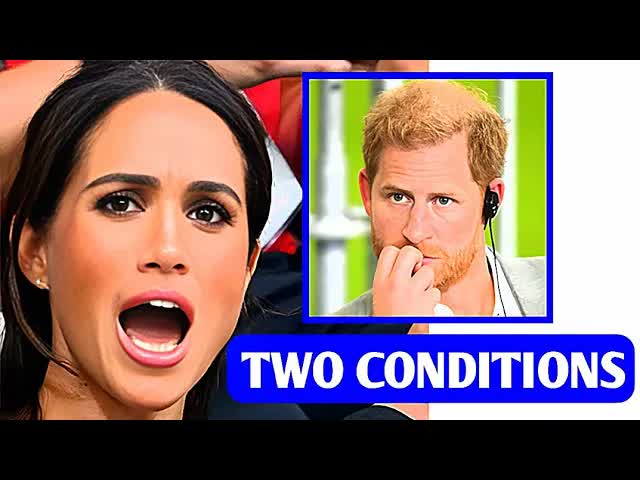The tumultuous relationship between Prince Harry and the British Royal Family continues to capture public interest, especially as Meghan Markle has recently articulated two essential conditions for any potential reconciliation.
While Harry is eager to mend fences with his family, the path to healing seems fraught with challenges.
Meghan’s demands could significantly influence not only their future but also the monarchy itself.
Before delving into Meghan’s stipulations, it’s crucial to understand the backdrop of this royal rift.
The bond between Prince Harry and his brother, Prince William, began to fray long before the couple stepped back from their royal duties in 2020—a move that became known as “Megxit.” This decision sparked a public feud fueled by differing perspectives on royal life and the relentless scrutiny of the media.
However, the situation escalated dramatically following Harry and Meghan’s candid interview with Oprah Winfrey in March 2021, where they made explosive allegations regarding racism and a lack of support within the royal household.
Meghan’s revelations about feeling isolated and even suicidal during her time as a senior royal sent shockwaves through the monarchy.
In response, Prince William asserted that the family was not racist, yet this statement did little to mend the already strained relationship between the brothers.
Their interactions at royal events have since become awkward, with minimal communication between them.
Now, Meghan has laid out her two non-negotiable conditions for any hope of reconciliation.
First on her list is a formal apology from Prince William and Kate Middleton.
Meghan believes that their treatment of her, which she claims negatively impacted her mental health, warrants acknowledgment.
Reports suggest that tensions between Meghan and the royal couple began long before her wedding in 2018, including an incident that left her in tears.
Meghan is adamant that an apology would be a significant step toward healing the rift.
Her second condition is equally important: she seeks a commitment from the royal family to treat her with kindness and respect moving forward.
Meghan’s past experiences within the royal sphere have left her wary, and she fears that without assurances of a supportive environment, any attempts at reconciliation will ultimately fail.
For her, these conditions are not just requests; they are vital for her well-being and future interactions with the family.
As for Prince Harry, opinions vary on his role in this family drama.
Some critics argue that he is merely following Meghan’s lead, while others believe he genuinely shares her concerns.
Harry has expressed a desire to reconcile with his family, emphasizing the need for accountability and recognition of past mistakes as a foundation for healing.
Despite attending royal events, his interactions with William remain strained, highlighting the deep-seated issues that still linger.
William and Kate’s position in this saga is pivotal.
As the future king and queen, their actions carry significant weight.
They have largely refrained from addressing the allegations publicly, focusing instead on their royal responsibilities and maintaining a dignified public image.
However, the accusations have undoubtedly hurt them, creating a dilemma: should they apologize and risk compromising the monarchy’s reputation, or maintain their silence?
The future of the royal family hangs in the balance.
With King Charles III now at the helm, the dynamics within the family are evolving.
Should Meghan’s conditions be met, it could herald a new era for the monarchy—one that embraces modernity and inclusivity.
Conversely, if the rift remains unresolved, it may continue to cast a shadow over the royal family, influencing the upbringing of younger royals like Prince George and Princess Charlotte.
This ongoing saga raises the question: can true reconciliation occur?
Meghan’s clear demands for an apology and respect pose a challenge, especially given the royal family’s traditional inclination towards privacy.
Harry finds himself navigating the complexities of his dual life—balancing his commitments to his family while forging a new path with Meghan.
The world watches closely, eager to see how this royal drama unfolds.
The stakes are high, not just for Harry and Meghan, but for the monarchy itself.
The conflict represents a critical juncture for the institution, echoing broader societal questions about whether the royal family can adapt to contemporary values.
Meghan’s experiences have sparked important conversations about race and inclusion, challenging the monarchy to reflect on its past and present.
Harry’s journey mirrors his mother’s struggles, as he seeks to carve out a life free from the relentless scrutiny that plagued Princess Diana.
His commitment to protecting Meghan and their children from media intrusion is a driving force behind his decisions.
While he cherishes his family and the traditions they represent, standing by Meghan and advocating for their narrative is equally important to him.
Public sentiment plays a significant role in shaping this narrative.
The British royal family has historically been intertwined with public opinion, but the dynamics have shifted.
Some view Harry and Meghan’s departure as a betrayal, believing they should have remained committed to their royal roles.
Critics argue that Meghan’s demands for an apology are excessive, suggesting that the couple should pursue reconciliation quietly rather than making their grievances public.










